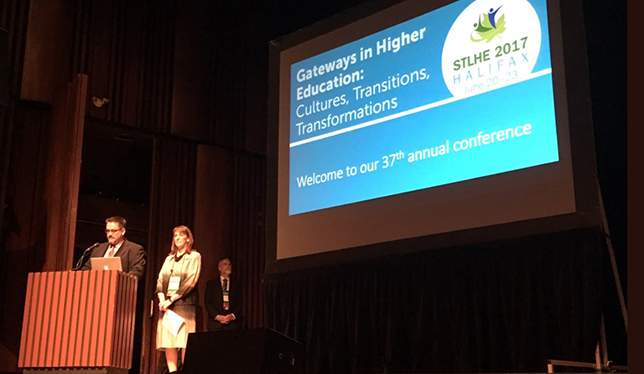Over the past several months, the federal government and university leaders have made it clear in public statements that equity and inclusion must become top priorities for the higher education sector – particularly where it concerns the recruitment and retention of international and Indigenous students, and equitable hiring practices for faculty.
The Society of Teaching and Learning in Higher Education, or STLHE, tapped into this growing sense of urgency regarding equity and inclusion at its 37th annual conference in Halifax last week.

From June 21 to 23, more than 770 delegates convened at Dalhousie and NSCAD universities under the banner of “Gateways in Higher Education: Cultures, Transitions, Transformations” to discuss the trickle-down issues that instructors, administrators and staff are facing with this push to make postsecondary institutions more inclusive spaces. The theme referred in part to “the gateways of education that bring a wide range of people together, from faculty, students, student services, retired faculty, college sector, and people from Australia, the U.K.,” said Jill McSweeney, conference volunteer coordinator and vice-chair of STLHE’s Teaching Assistant and Grad Student Advancement sub-group. Gateways, she noted, are also thresholds and this conference was a chance to address “threshold concepts” – transformative ideas for “bringing students across a threshold and empowering them in their learning across all contexts.”
“We’re passing through so many gateways and thresholds as we face the challenges of the 21st century,” said STLHE president Robert Lapp during opening remarks Wednesday morning. “The STLHE itself is a kind of gateway … [that] intentionally breaks down barriers” to facilitate collaboration and connections.
Session tracks on Indigenization, internationalization and learner-centred course design addressed many of these concerns, but nearly all tracks – including assessment, experiential learning and supporting faculty – touched on issues around teaching and working in increasingly diverse communities. Specific presentations, for example, examined the negative experiences of LGBTQ faculty and racialized faculty on Canadian campuses, the bridging of Indigenous and Western knowledge systems, and understanding the needs of Indigenous students.
“There were practical sessions to enrich teaching and student services [in these areas] but also sessions that spoke deeply about the history of diversity and inclusivity in Canada,” said Dr. McSweeney, who is an educational developer at Dalhousie’s Centre for Teaching and Learning.
Internationalization was a common theme during a panel on Thursday morning that included the executive director of the Association of Atlantic Universities and the presidents of Dalhousie, NSCAD and Mount Saint Vincent University. Peter Halpin of the AAU noted the significance of discussing “gateways” in a region that has identified immigrants and international students as essential to a healthy economic future (Nova Scotia, New Brunswick, Newfoundland and Labrador, and Prince Edward Island have some of the most rapidly aging and declining provincial populations in the country). However, outgoing MSVU president Ramona Lumpkin was careful to link international student admissions to benefits beyond financial stability. “We’ve all struggled with the perception that we are just focusing on international students to counteract that [population decline]. But I think our interest in international students predates it. There are real gains for having them on our campuses and in the region. But we really have to be sure we’re supporting them, particularly with language education.”
This year, STLHE has also committed to improving the number of French and bilingual services it offers members. At the group’s annual general meeting on Thursday, its board of directors acknowledged that it had secured new funds for translation in both official languages and had improved the ratio of French-language content to English-language content in STLHE publications and conference sessions. This year, six sessions were presented in French out of 127 workshops and 145 research papers.
University Affairs was a sponsor of the STLHE conference.